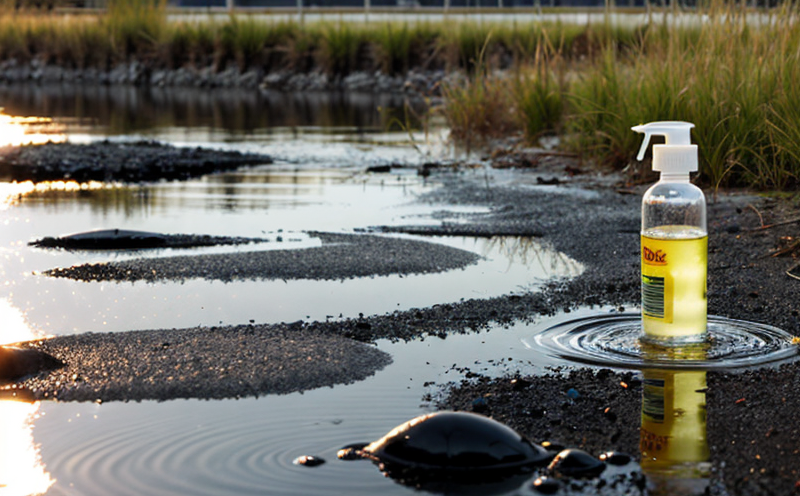ASTM D3869 Iodide Test in Water
The ASTM D3869 test method is a widely recognized and internationally accepted protocol used to determine the iodide concentration in water samples. This essential analytical procedure plays a critical role in ensuring the safety and quality of drinking water, wastewater treatment processes, and other applications where iodide content must be monitored.
The iodide ion (I-) is an important element that can have both beneficial and detrimental effects depending on its concentration. In low concentrations, iodide is essential for thyroid function; however, in higher concentrations, it can cause adverse health effects such as goiter or hypothyroidism. Therefore, accurate measurement of iodide in water samples is crucial for compliance with regulatory standards.
The ASTM D3869 method involves the titration of a known volume of the sample against standard silver nitrate (AgNO3) solution using potassium chromate as an indicator. The reaction between iodide ions and silver ions forms a precipitate, which can be quantified by observing the endpoint change in color from yellow to red.
The apparatus used for this test includes a burette, stoppered conical flask, magnetic stirrer, and calibrated pipettes. Proper sample preparation is vital; typically, distilled water or deionized water is required as the blank solution. The testing procedure must adhere strictly to ASTM D3869 guidelines to ensure accurate results.
The acceptance criteria for this test are based on the precision and accuracy of the method described in ASTM D3869. Typically, reproducibility limits are specified within a range that ensures consistent and reliable results across different laboratories. Compliance with these standards is critical for maintaining trust in laboratory testing results.
- Sample Preparation: The sample should be prepared according to the ASTM D3869 protocol, which includes dilution if necessary to ensure it falls within the linear range of the titration curve.
- Instrumentation: A burette for dispensing AgNO3, a magnetic stirrer to maintain uniform mixing during titration, and calibrated pipettes for accurate volume measurement are essential components.
- Reagents: Standard silver nitrate solution, potassium chromate indicator, and distilled water or deionized water as the blank solution.
The ASTM D3869 method is particularly useful in sectors such as environmental monitoring, water treatment facilities, and industrial processes where compliance with regulatory requirements is mandatory. By adhering to this standard, laboratories can provide accurate iodide concentration data that contributes significantly to public health and safety.
Why It Matters
The ASTM D3869 iodide test in water is crucial for several reasons. Firstly, it helps ensure compliance with national and international standards such as the World Health Organization (WHO) guidelines on drinking water quality. These regulations specify permissible levels of various contaminants, including iodide, to safeguard public health.
Secondly, this test method is vital in wastewater treatment processes where the removal and monitoring of iodide ions are necessary to prevent their release into the environment. Excessive iodide can disrupt aquatic ecosystems and harm wildlife.
In addition, industries that use water for manufacturing or cooling purposes may rely on accurate iodide measurements to avoid potential contamination of products or equipment. The precision and reliability provided by ASTM D3869 contribute significantly to these industry standards.
The results from the ASTM D3869 test are also essential for researchers studying the behavior of iodide in different water matrices, which can inform further development of treatment technologies and environmental policies. By providing accurate data on iodide concentrations, this method plays a pivotal role in advancing knowledge across various scientific disciplines.
Eurolab Advantages
At Eurolab, our commitment to excellence ensures that we offer the most advanced and reliable testing services for ASTM D3869 iodide tests in water. Our team of experienced chemists and technicians are well-versed in the latest techniques and standards, ensuring accurate and consistent results.
We utilize state-of-the-art laboratory equipment and adhere strictly to international standards such as ASTM D3869, ISO 17025, and EN ISO/IEC 17025:2017. This guarantees that our test results are not only precise but also fully compliant with global regulatory requirements.
Our clients benefit from our extensive expertise in water quality testing, which includes a wide range of contaminants such as heavy metals, pesticides, and organic compounds. By leveraging this comprehensive knowledge base, we can provide holistic solutions that address complex environmental challenges.
We also offer fast turnaround times and transparent communication throughout the testing process. Our clients receive detailed reports that include all relevant data points, ensuring they have a clear understanding of their results.
Quality and Reliability Assurance
- Dedicated Quality Management: Eurolab employs a robust quality management system that is ISO/IEC 17025:2017 compliant. This ensures that all our processes are consistently audited to maintain the highest standards.
- Regular Calibration: Our instruments undergo regular calibration and verification checks to ensure they meet or exceed international standards.
- Trained Technicians: All our technicians receive continuous training in the latest testing methodologies, ensuring that we are always up-to-date with industry best practices.
Our commitment to quality and reliability is further demonstrated through our rigorous internal audits and external accreditation. This ensures that every test conducted at Eurolab meets or exceeds the required standards, providing clients with confidence in their results.





